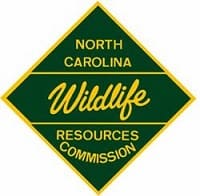North Carolinia Randleman Reservoir Habitat Enhancement Project Under Way
OutdoorHub 07.22.13

The N.C. Wildlife Resources Commission recently partnered with the Piedmont Triad Regional Water Authority to enhance aquatic vegetation in Randleman Reservoir, a 3,000-acre reservoir located in Randolph and Guilford counties.
In June, Commission staff helped build 13 fenced-in, protected areas in the reservoir and planted them with aquatic vegetation. The protected areas are located in shallow areas near the shore and will help shield the young plants from turtles, carp and other predators that eat aquatic vegetation.
Mark Fowlkes, an aquatic habitat coordinator for the Commission, hopes the groups of plants, known as “founder colonies,” will grow outside of the fenced areas and spread to other parts of the reservoir.
“We planted emergent, rooted-floating leaf and submerged plant species, such as lizard tail, arrowhead, soft-stem bulrush, pickerelweed, white-water lily and eelgrass, to provide nursery habitat for young fish and cover for adults,” Fowlkes said. “Fishing is a popular activity in Randleman. By adding aquatic vegetation, both in the lake and along the shoreline, we are providing much needed habitat for fish, such as largemouth bass and crappie. It is our hope that anglers will eventually be able to fish around the established vegetation and increase their chances of catching fish.”
Randleman Reservoir opened to the public in 2010. Like most piedmont reservoirs, it has little to no native aquatic vegetation.
“The establishment of native vegetation not only provides needed fish habitat, but it also makes the shoreline less susceptible to the establishment of non-native invasive vegetation, which can be expensive to control,” Fowlkes said. “Establishing a healthy native aquatic plant community will make it harder for invasive species to take hold, and save money in the long run.”
The Piedmont Triad Regional Water Authority purchased all the materials for the joint project while the Commission provided technical guidance and manpower. The project was funded in part through the Sport Fish Restoration Program, which utilizes state fishing license money and federal grant funds derived from federal excise taxes on fishing equipment and motorboat fuels.
For more information about aquatic habitat conservation work, visit the Commission’s website, www.ncwildlife.org/fishing.

